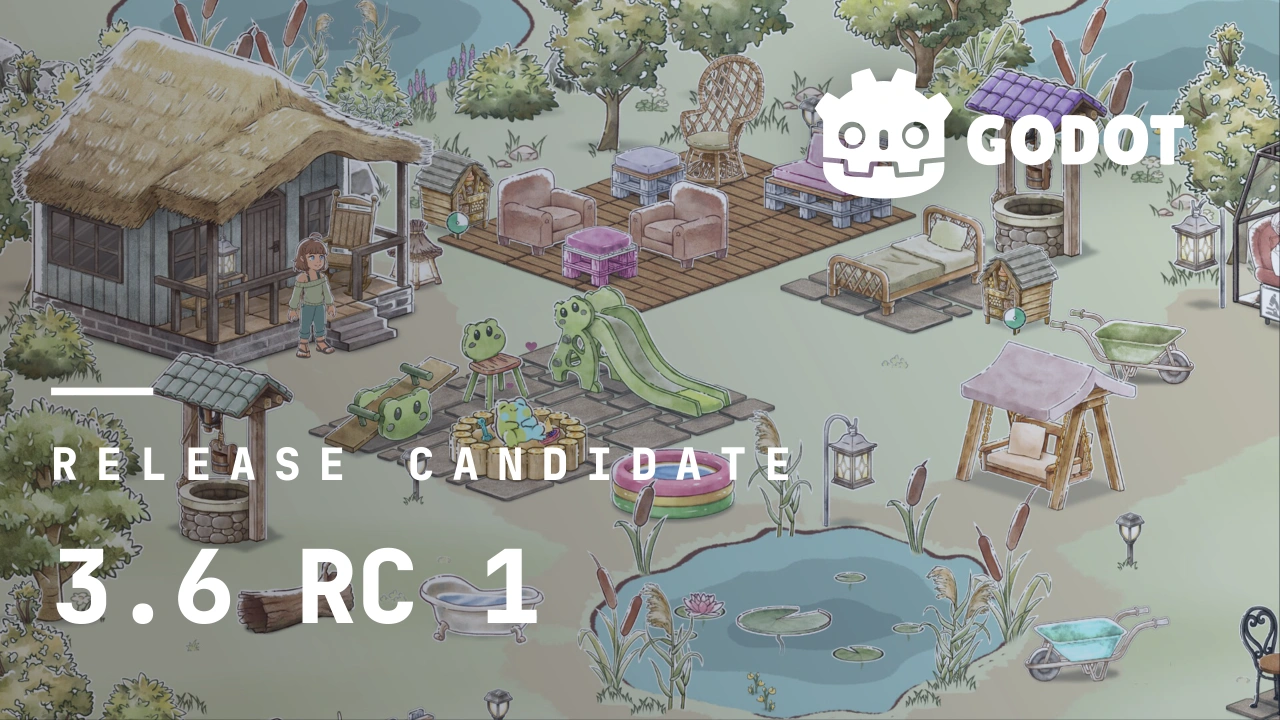The upcoming Godot 3.6 is now considered feature complete, and has received a lot of bugfixes and improvements over the past weeks thanks to all the testers and developers who reported and fixed issues. We are now at the Release Candidate stage, finalizing everything so that we can release 3.6-stable for all users.
At this stage we need people to test this release (and potential follow-up RCs) on as many projects as possible, to make sure that we catch non-obvious regressions that might have gone unnoticed until now. If you run into any issue, please make sure to report it on GitHub so that we can know about it and fix it!
As a reminder, this is a feature update to the Godot 3.x branch, which means it’s only relevant for users currently using Godot 3.5 or 3.6-beta. Projects made with Godot 4.x cannot be downgraded to Godot 3. While most of the engine development focus is on Godot 4.3, some dedicated contributors still allocate some time to finalizing 3.6 for the many users who still have games in production using Godot 3.
This RC 1 has a number of fixes since beta 5, including:
- Fix scene shader regression (GH-92070)
- Fix
merge_meshes()functionality (GH-92105) - Fix pausing behaviour with physics interpolation (GH-93382)
- Fix 2D skinning with physics interpolation (GH-93309)
- Fix viewport behaviour with physics interpolation (GH-92152)
- Fix text to speech loaded too early (GH-92261)
- Fix physics tick counter (GH-92941)
- Faster editor grid (GH-92725)
Jump to the Downloads section, and give it a spin right now, or continue reading to learn more about improvements in this release. You can also try the Web editor or the Android editor for this release. If you are interested in the latter, please request to join our testing group to get access to pre-release builds.
The cover illustration is from Kamaeru: A Frog Refuge, a cozy frog collecting game which has you restore the biodiversity of wetlands, developed in Godot 3 by Humble Reeds and published by Armor Games Studios. Kamaeru was released in June on Steam, Switch, and Xbox.
Highlights
For full details of highlights since Godot 3.5, see the beta blog posts for (beta 1, beta 2, beta 3, beta 4, and beta 5).
For a complete overview of the changes, see our interactive changelog.
Brief highlights include:
- 2D physics interpolation (GH-76252)
- 2D hierarchical culling (GH-68738)
- Tighter shadow culling (GH-84745)
- Discrete Level of Detail (LOD) (GH-85437)
- Mesh merging (GH-61568)
- ORM materials (GH-76023)
- Vertex cache optimization (GH-86339)
- View selected mesh stats (GH-88207)
- SceneTree dock’s filter improvements (GH-67347)
- Android dependencies update matching API level 34 (GH-87588)
- Lots of bug fixes all around, which should significantly improve stability
These may results in performance increases in existing projects, even with no changes to the project. As such we recommend testing out your existing games, with a view to re-exporting and distributing once we reach stable.
Changes
10 contributors submitted exactly 30 improvements for this release. See our interactive changelog for the complete list of changes since the previous 3.6-beta5 snapshot. You can also review all changes included in 3.6 compared to the previous 3.5 feature release.
This release is built from commit cfc4a0eff.
Downloads
Standard build includes support for GDScript, GDNative, and VisualScript.
.NET build includes support for C#, as well as GDScript, GDNative, and VisualScript.
- You need to have dotnet CLI or MSBuild installed to use the Mono build. Relevant parts of Mono 6.12.0.198 are included in this build.
While engine maintainers try their best to ensure that each preview snapshot and release candidate is stable, this is by definition a pre-release piece of software. Be sure to make frequent backups, or use a version control system such as Git, to preserve your projects in case of corruption or data loss.
Bug reports
As a tester, we encourage you to open bug reports if you experience issues with this release. Please check the existing issues on GitHub first, using the search function with relevant keywords, to ensure that the bug you experience is not already known.
In particular, any change that would cause a regression in your projects is very important to report (e.g. if something that worked fine in previous 3.x releases no longer works in this release).
Support
Godot is a non-profit, open source game engine developed by hundreds of contributors on their free time, as well as a handful of part or full-time developers hired thanks to generous donations from the Godot community. A big thank you to everyone who has contributed their time or their financial support to the project!
If you’d like to support the project financially and help us secure our future hires, you can do so using the Godot Development Fund platform managed by Godot Foundation. There are also several alternative ways to donate which you may find more suitable.
